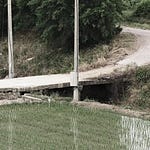You are invited to a walk by the riverside. You do not plan the walk. You do not plan the sight. As if there is a need, a calling, an urge to respond to that invitation, not just artificially, but deeply, within oneself. And that calling has a plan of its own, not even known to itself, but unfolds every step as you walk, revealing itself, unexplained.
Since you respond to the invitation, the fact of you being walking by the riverside is the only thing that matters. That’s the meaning of the response: that it encapsulates the whole scenery, the whole unfoldment, and in that, simply, there is no need for navigation. It’s not like you are at risk of going completely off-trail, but even if it was, it has no meaning for you to navigate. You accepted the invitation, and in so many ways, you chose to be lost—lost to choices, lost to navigation, lost to yourself.
Naturally, from a very deep place, which is unknown to you, the calling comes to shape, for example, as a talk. And it talks about navigation, does one need at all navigation in life? It seems that navigation, choices, doing the right thing—all that is occupying one’s total life. And the question is there, very clearly: is there a need for that? Is there value in that? What is the result of that?
Can one live without navigation, just walking by the riverside? Can one follow the stream as the stream chooses, unexpectedly, now? It’s a question. It’s a question that is more present and more real than any choice and any navigation. It’s an invitation to be found in being lost, or to wake up to no sleep.
You cannot fight to the end of conflict. Only clarity can bring an end to blindness. And that clarity doesn’t come by navigation. But you question that. You accept the invitation. You walk by the riverside. And you let the question question. You don’t choose.
For those who asked, you can now try the QLN five principles tool from this link













Share this post